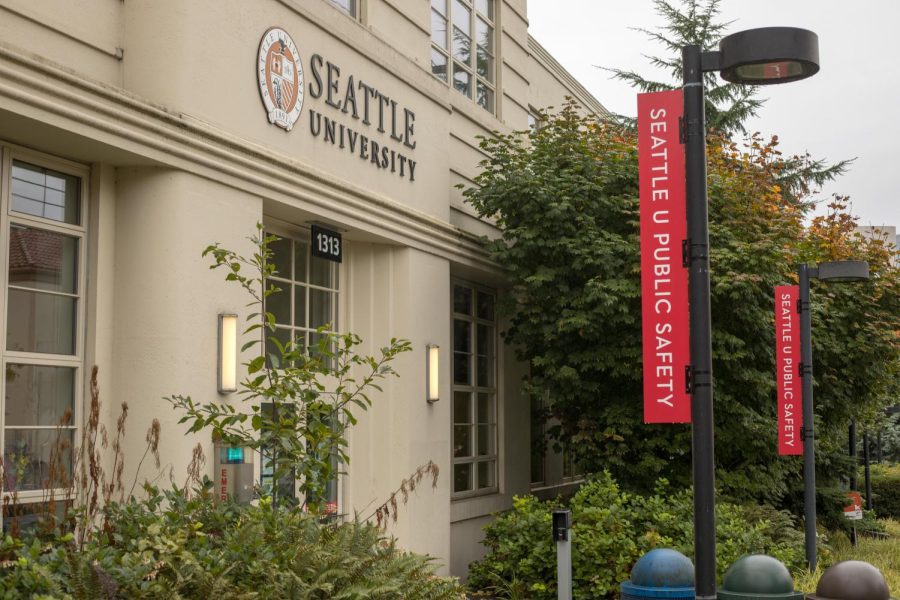Safety and Justice: How can they Co-exist?
A Seattle University student’s car was stolen from the Pigott Parking Lot Tuesday evening, as the suspect hurled verbal threats before taking off with the vehicle. A day later, Public Safety sent an email to Seattle University students describing the theft and their response.
Chris Wilcoxen, the assistant director of Emergency Operations at Seattle U Public Safety, gave out his best tips for students to stay safe on campus, and encouraged concerned individuals to attend Public Safety’s self defense workshops.
“Awareness is the number one concern,” Wilcoxen said. “Pay attention to your surroundings. Don’t leave your belongings around even if you need to go use the restroom. Always keep them on you. For students with vehicles, make sure things aren’t in sight for people passing by, and always keep it locked while you are away.”
There have been four other incidents since the beginning of the school year. Two storage spaces were broken into, a Zipcar was stolen and a personal bag was taken from the Sinegal Center. Isabelle Fong, a first-year premajor student, believes that Public Safety can do more to keep students alert and aware of situations on campus.
“I do feel like this is a really safe campus,” Fong said. “At the same time though, I honestly don’t think the emails do enough to keep people informed. I know there was a period of longer than 24 hours between one incident and the email alerting us about it. It’s kind of scary to learn that late because I was in the Sinegal Center just a few hours after the bag was stolen. I definitely think an immediate text message would do a lot of good.”
In their most recent email, Public Safety stressed that they didn’t think the thefts were a persistent danger to students, but recognized the gravity of the situation. They promised to coordinate with the Seattle Police Department (SPD) to address any ongoing concerns.
Increasing contact with the SPD is a contentious topic on campus and across Seattle, as reform advocates argue that may not be the best solution to petty offenses. The Capitol Hill neighborhood has a history of gentrification. Activists say it has pushed working class families out of their homes and jobs, and into concentrated areas of poverty.
David Gould, the director and owner of Seattle Sober Living, a transitional housing facility that operates in Capitol Hill, spoke to his own experience with reducing crime.
“Put quite simply: when people get sober, or get out of poverty, they tend not to commit crime,” Gould said. “ I have had run-ins with the criminal justice system. When people are in the midst of drug and alcohol addiction, or poverty, they will do things they normally wouldn’t do to sustain either their addiction or themselves.”
Gould discussed the resistance some community members showed to the opening of Seattle Sober Living’s Capitol Hill house, pointing out that it would be misguided to focus solely on increasing numbers of police patrols while not dealing with the root cause of these issues.
“The way to stop a good deal of crime isn’t through punitive means. You can have hundreds of cops lining the street, but people are still going to commit crime,” Gould said. “We often see a lot of resistance to halfway houses or other rehabilitative care services opening up. Especially with such stigmatized conditions such as addiction or extreme poverty, rehabilitative services actually go a lot farther to reduce crime than punitive ones.”
Back on campus, Fong believes there should be more public safety officers on patrol at night, but also wants to consider the influence it could have on the Capitol Hill community.
“We shouldn’t be afraid of the neighborhood around us. Our school is in the center of Capitol Hill and we should really consider the impact we could have on that community. I think if we made an effort to interact with the world around us, we could prevent some of that crime from happening in the first place,” Fong said.
Seattle U has a unique position in the middle of Capitol Hill to spearhead a change in the way criminal justice operates. Many experts agree that heavier policing is not the most efficient way of reducing crime. A multifaceted view of justice and public safety that incorporates lived experiences may be required to make true progress.


